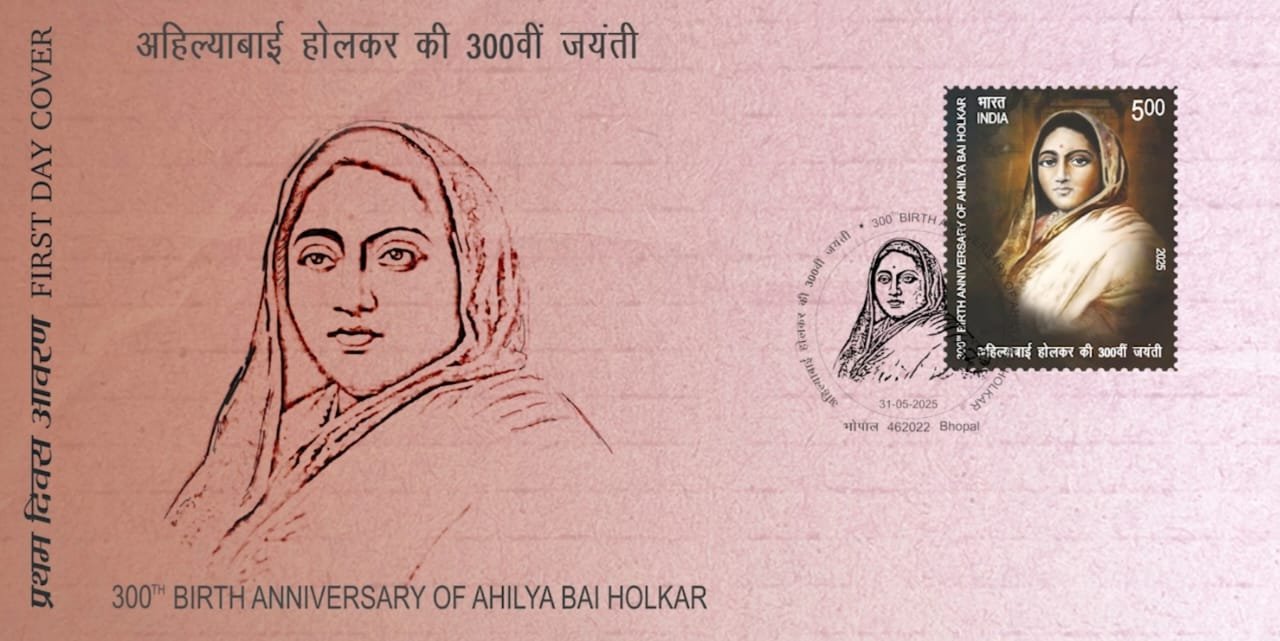Ahilya Bai Holkar

Technical Data
| Date of Issue | May 31, 2025 |
|---|---|
| Denomination | Rs. 5 |
| Quantity | 202,800 |
| Printer | Security Printing Press, Hyderabad |
| Printing Process | Wet Offset |
| Colors | Multicolor |
| Credit (Designed By) | Mr. Anuj Kumar |
| Catalog Codes |
Colnect codes IN 2025.05.31-01 |
| Themes | Famous people | Queens | Women |
Ahilya Bai Holkar Stamp – Celebrating the 300th Birth Anniversary of a Visionary Queen
The Ahilya Bai Holkar Stamp pays tribute to one of India’s most revered women rulers, whose reign from 1767 to 1795 transformed the Malwa region into a land of prosperity, justice, and cultural brilliance. Issued on the 300th birth anniversary of Ahilya Bai, this commemorative postage stamp honours her enduring legacy as a monarch, reformer, and symbol of empowerment.
Early Life and Rise to Power
Born in 1725 in Chondi, Maharashtra, Ahilya Bai Holkar came from a humble Deshmukh family. Her father, Mankoji Shinde, ensured she received education and exposure to governance from a young age. At 19, she married Khanderao Holkar, son of Malhar Rao Holkar, founder of the Holkar dynasty.
Tragedy struck in 1754 when her husband died in battle, leaving her widowed with a young daughter. Recognising her inner strength and leadership potential, her father-in-law Malhar Rao guided her in administration and statecraft. Following his death in 1766, Ahilya Bai ascended the throne in 1767, becoming one of the few women rulers in Indian history.
A Golden Era of Governance
Ahilya Bai Holkar’s reign is remembered as a golden era. She ensured fair governance, maintained peace, and promoted inclusive justice. Her compassionate leadership won her admiration across social classes, while her diplomacy helped safeguard Malwa’s independence amid rising external threats, including the British East India Company.
Builder, Patron, and Visionary
Under Ahilya Bai’s leadership, Malwa prospered economically and culturally. She invested in roads, forts, and trade routes that boosted connectivity and commerce. Her most iconic architectural contributions include the Maheshwar Fort and numerous temples and ghats along the Narmada River, many of which still stand as living monuments of her vision.
As a great patron of arts and culture, she fostered music, dance, and literature. Her court became a vibrant centre for scholars and poets, sparking a cultural renaissance. Known for her love of poetry, she often participated in literary gatherings herself.
Champion of Social Welfare and Education
Ahilya Bai’s compassion extended to social welfare. She established schools, dharamshalas, and hospitals, believing in the transformative power of education, particularly for women. Her efforts laid the foundation for future progress in women’s empowerment and public health.
She also practised religious tolerance, inviting scholars of various faiths to her court, thereby nurturing harmony among diverse communities. Her initiatives to provide clean water and support agriculture reflected her care for the everyday needs of her subjects.
Legacy of Empowerment
Ahilya Bai Holkar passed away on 13 August 1795, but her legacy as a courageous queen, wise administrator, and compassionate reformer continues to inspire India. She not only transformed Malwa but also redefined the role of women in leadership, challenging the norms of her time.
Today, Ahilya Bai is celebrated as a symbol of women’s empowerment and visionary governance. Her story resonates with generations striving for justice, equality, and recognition.
Commemorative Stamp Release
To honour her 300th birth anniversary, the Department of Posts proudly issues the Ahilya Bai Holkar Stamp. This commemorative postage stamp captures the essence of her reign—a blend of courage, cultural renaissance, and social commitment.
For philatelists and history lovers alike, the stamp is more than a collectible. It is a tribute to one of India’s greatest queens, whose wisdom and compassion shaped history and continue to inspire the future.
The Ahilya Bai Holkar Stamp stands as a lasting reminder of a monarch who combined strength with compassion, leaving behind a legacy of justice, culture, and empowerment.
First Day Cover


Leave a Comment
You must be logged in to post a comment.